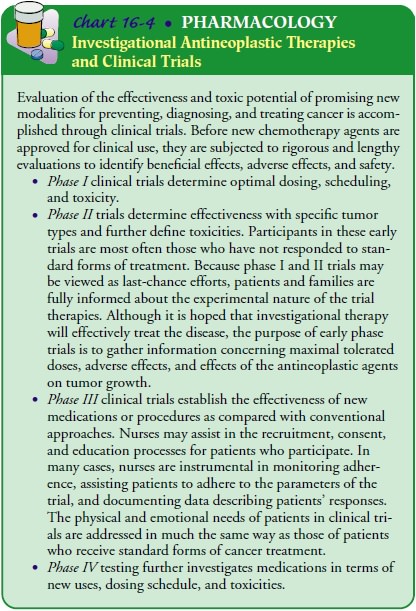Chapter: Medical Surgical Nursing: Oncology: Nursing Management in Cancer Care
Gene Therapy - Management of Cancer
GENE
THERAPY
As early as 1914, the somatic mutation theory of cancer sug-gested that
cancer develops as a result of inherited or acquired genetic mutations that
lead to a disturbance in the normal chro-mosomal balance regulating cell growth
and reproduction. Technological advances and information gained through
in-tense study of genetics have assisted researchers and clinicians in
predicting, diagnosing, and treating cancer. Gene therapy includes approaches
that correct genetic defects or manipulate genes to induce tumor cell
destruction in the hope of prevent-ing or combating disease. Somatic cell (any
cell not contained in an embryo or destined to become an egg or sperm) gene
ther-apy is the only publicly funded form of gene therapy in the United States.
This type of therapy involves the insertion of a desired gene into the targeted
cells. Human germ cell manipu-lation is considered by many to be controversial
and a potential source of bioethical concerns (Frankel & Chapman, 2000).
Although gene therapy is currently investigational, researchers predict
it will have a profound impact on medical and health care in the 21st century.
More than 100 clinical trials for gene ther-apy in treating cancer have been
initiated. An example of one such trial involves inserting the p53 tumor
suppressor gene into cancer cells. Normally this gene is responsible for
repairing dam-aged cells or causing cell death when the cell cannot be
repaired. Many types of cancer cells have mutated p53 genes that then lead to
uncontrolled cell growth. Insertion of normal p53 genes can lead to either
cancer cell death or slowing of tumor growth. This approach has been tested in
lung, head and neck, and colon can-cers (Wasil & Buchbinder, 2000). In
another clinical trial, a “sui-cide gene” is inserted into tumor cells to
facilitate cell death. When the gene for herpes simplex virus thymidine kinase
is in-serted into malignant cells, those cells become infected with the virus
and susceptible to destruction by antiviral drugs, such as ganciclovir. This
approach has been tried in treating brain, ovarian, and breast cancers
(Fibison, 2000). For more information about investigational therapies, see
Chart 16-4.

Related Topics